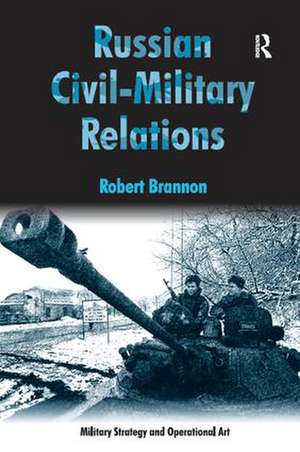Russian Civil-Military Relations: Military Strategy and Operational Art
Autor Robert Brannonen Limba Engleză Hardback – 28 mar 2009
Din seria Military Strategy and Operational Art
-
 Preț: 469.34 lei
Preț: 469.34 lei -
 Preț: 449.41 lei
Preț: 449.41 lei -
 Preț: 406.71 lei
Preț: 406.71 lei -
 Preț: 469.34 lei
Preț: 469.34 lei -
 Preț: 469.34 lei
Preț: 469.34 lei - 18%
 Preț: 1060.25 lei
Preț: 1060.25 lei - 18%
 Preț: 1058.23 lei
Preț: 1058.23 lei - 18%
 Preț: 1059.45 lei
Preț: 1059.45 lei -
 Preț: 427.77 lei
Preț: 427.77 lei - 25%
 Preț: 768.36 lei
Preț: 768.36 lei -
 Preț: 392.54 lei
Preț: 392.54 lei - 17%
 Preț: 257.49 lei
Preț: 257.49 lei - 18%
 Preț: 1109.99 lei
Preț: 1109.99 lei - 26%
 Preț: 848.15 lei
Preț: 848.15 lei -
 Preț: 416.22 lei
Preț: 416.22 lei - 16%
 Preț: 262.35 lei
Preț: 262.35 lei - 18%
 Preț: 836.89 lei
Preț: 836.89 lei - 16%
 Preț: 263.94 lei
Preț: 263.94 lei - 30%
 Preț: 771.32 lei
Preț: 771.32 lei
Preț: 1011.33 lei
Preț vechi: 1233.33 lei
-18% Nou
Puncte Express: 1517
Preț estimativ în valută:
193.54€ • 200.83$ • 161.77£
193.54€ • 200.83$ • 161.77£
Carte tipărită la comandă
Livrare economică 15-29 martie
Preluare comenzi: 021 569.72.76
Specificații
ISBN-13: 9780754675914
ISBN-10: 0754675912
Pagini: 352
Dimensiuni: 156 x 234 x 21 mm
Greutate: 0.77 kg
Ediția:1
Editura: Taylor & Francis
Colecția Routledge
Seria Military Strategy and Operational Art
Locul publicării:Oxford, United Kingdom
ISBN-10: 0754675912
Pagini: 352
Dimensiuni: 156 x 234 x 21 mm
Greutate: 0.77 kg
Ediția:1
Editura: Taylor & Francis
Colecția Routledge
Seria Military Strategy and Operational Art
Locul publicării:Oxford, United Kingdom
Cuprins
Contents: Foreword; Preface; Russian civil-military relations in transition; Military doctrine and security strategy in modern Russia; Past as prologue: setting the scene, 1996-1998; Case I: The Russians are coming! The race to Pristina airport, June 1999; Case II: The 2nd road to war in Chechnya: Dagestan, July-September 1999; Case III: High seas tragedy and military drama: the Submarine Kursk tragedy, August 2000; Conclusions; Epilogue: Russia and Georgia: the summer of 2008; Appendices; Bibliography; Index.
Notă biografică
Dr Robert B. Brannon is Director, Program in Advanced Security Studies, College of International and Security Studies, George C. Marshall European Center, Germany.
Recenzii
'Comes at just the right time. An important work that answers vital questions about Russian motives and military actions today'. James Howcroft, United States Marine Corps 'At a time of global economic crisis and sharply changing international relationships, Brannon's perceptive evaluation of civilian-military relations within the Russian Federation permits readers to develop a clearer and more profound appreciation of the challenges faced by the United States and its Western Allies as they face the uncertainties of the future.' David M. Glantz, The Citadel, Charleston, USA 'Robert Brannon has produced an insightful, concise account of the evolution of civil-military relations in post-Soviet Russia. He draws well on the theoretical literature on civil-military relations and carefully shows how and to what extent civilian authority was actually exercised over Russia's armed forces in the decade after the Soviet regime collapsed. This book is a valuable contribution to the literature and will be very useful for courses on Russian politics and on civil-military relations.' Mark Kramer, Harvard University, USA 'Robert Brannon has written an excellent book on civil-military relations in post-communist Russia. Linking civilian control to national security policy, military doctrine and performance, Brannon’s nuanced analysis reaches beyond the political narrative of his case studies to explore the fundamentals of the process. Erudite, subtle and well-written, the book is a must read for anyone interested in post-communist transitions and civil-military relations in general.' Andrew A. Michta, George C. Marshall European Center for Security Studies, Germany '...this book is an important contribution to the literature on civil-military relations in Russia, is very well written, and contains a great deal of useful information. The book is also particularly useful in that it contains the full texts of all of the Russian national security documents from 199
Descriere
Deriving in part from its Soviet past, Russia's military doctrine represents more than just a road map of how to fight the nation's wars; it also specifies threats to national interests, in this case the United States, NATO and international terrorism. Against this background, Robert Brannon demonstrates that the military's influence may reveal as much about politics as it does the military.








